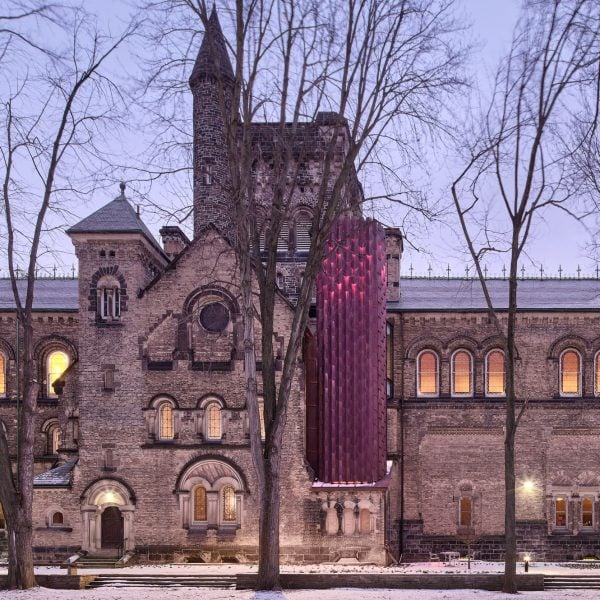[ad_1]
Canadian studios Kohn Shnier and ERA Architects have renovated a historic building at the University of Toronto to make it more accessible.
Local firms Kohn Shnier and ERA Architects team up for the 2,230-square-metre project, which involved bringing cohesion to the different spaces through a set of contemporary interventions.
Built in 1859, the University College is one of the oldest buildings on campus, and therefore not fully accessible in line with today’s mandates.
Overall, the building required updates to its circulation, as well as the integration current technologies, while preserving its history.
“One of the main challenges was to maintain a comprehensive and cohesive design vision of the project over a scope that is disparately distributed throughout the building fabric, over three levels,” said Kohn Shnier.
To tackle the “gordian knot” of incremental level changes across the sprawling complex, a variety of ramped surfaces were added and highlighted through floor patterns.
A new elevator shaft was built outside of the existing envelope.
Visible from the university courtyard, this addition is clad in copper scales to provide a contemporary contrast against the gothic-style stonework.
“The project dismantles the legacy of physical barriers by not only providing the requirements for universal access but by celebrating the architectural insertions that achieve it,” said the studios.
Another key element of the project was reintroducing library spaces to the great halls on the building’s second storey, which had previously been used for this purpose before a fire in 1890.
Minimal black bookshelves flow into guardrails made of vertical slats, which draw the eye up to the impressive wooden ceiling.
Curving white staircases connect the lower library level with a new mezzanine, inserted as “a large-scale furniture element” so that it barely touches the historic plaster walls.
Supporting the reinstated library areas are a new reading room, a conferencing centre, rejuvenated classrooms, a student writing centre and a cafe.
Services including IT, lighting, A/V and mechanical systems were fully integrated so as not to impose on the 19th-century architectural details, like the stained glass windows and carved stone grotesques.
To contrast the existing historic wood floors, wainscot and detailing, a simple palette was chosen comprising dark-stained white oak, blackened steel, bright white, and red to add colour.
“Our design style neither mimics nor rejects the history of its host but plays off its eclectic material palette, celebrating the college by bringing it into the present while preparing it for the future,” the team said.
Many historic university buildings around the world have needed help being brought into the 21st century.
For example, a 120-year-old student centre at Yale University reopened last year following a restoration project by Robert A M Stern.
The photography is by Doublespace.
Project credits:
Architects: Kohn Shnier and ERA Architects
Kohn Shnier team members: John Shnier, Maggie Bennedsen, Amin Ebrahim, Tristan van Leur, Roxana Lilova, Kiana Mozayyan Esfahani
ERA Architects team members: Graeme Stewart, Max Berg, Leah Gibling
Structural: Blackwell Engineering
Mechanical: HIDI
Electrical: HIDI
Lighting: Alula Lighting
Contractor: MJ Dixon (GC), Eventscape (Croft Chapter House acoustic canopy fabricator/contractor)
Lighting: Alula Lighting
[ad_2]

